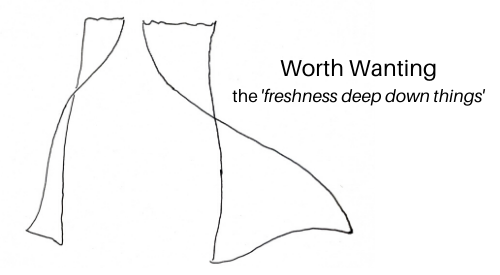
Encounters are units of intrinsic value, sufficient in and of themselves, needing nothing additional from us. Even unintentional, they occur and they endure.
Encountering as a way of life is different; it requires some intention. As those wanting to encounter more often in more ways with more types of others, it pays for us to ready ourselves to recognize and risk encountering others.
While actually encountering, the making of common cause proceeds as it does, no agenda, no second guessing, no meta. Afterwards, however, is the third phase of encountering, reflection. Here is where we we encounter the encounter itself.
Reflecting on encounters and encountering, by ourselves or with others, is important and gratifying in different ways.
–It helps us discern the freshness that manifests in our encounters and which gives them their enduring value. Frequently, we don’t pick up on that freshness till we reflect after the fact, even well after.
–It is the basis of a fellowship of shared experience and practical support.
–It helps us engage freshly with our memories as encounters.
–Finally, reflecting helps us see ourselves as living simultaneously in both the mundane and the transcendent worlds, with all the implications of that.
It is not a problem if we don’t reflect on our encounters; there’s no penalty. But reflection does encourage and help us become better encounterers, more ready to risk and more reflective; more and better encounterers make for a better mundane world.
We say to ourselves, ‘Hey, that was an encounter,’ and we reflect on it privately, perhaps guided by some of the questions here.
But we also sometimes come together with others for collective reflecting, which has a different focus.
Collective reflecting first and foremost celebrates the context of all encountering: that a transcendent realm exists, that it interacts with us in and through encounters, and that encountering is a good thing to do.
In collective reflecting, we share stories from history or current events or fiction extolling encountering, and include our own experiences in the practice, good, hard, and could be better. We, however, avoid sharing details of our encounters with other people for several reasons:
–consent and accuracy: no one participant in an encounter has the right, nor in fact the ability to fully and fairly share what occurred;
–translation distortion: second person experiences are richer and more immediate than any third person account we give of them;
–the risk of gossip: the habit of focusing on people as objects rather than as others needs no reinforcement.
Also, it can happen that focus on stories of encounters can distract us from remembering the key concerns of collective reflecting:
–the kind of world we live in that makes encountering possible,
–what we can do to become better encounterers,
–what encounters we want to prepare next for.
A time of collective reflecting is also a good time to detect any deficiencies of the doctrine and any distortions of reality as depicted by it.
Collective reflecting is a corporate encounter with encountering itself. In that encounter space of celebrating, championing and challenging, freshness manifests itself as an exhilarating sense of freedom, hope and empowerment.
